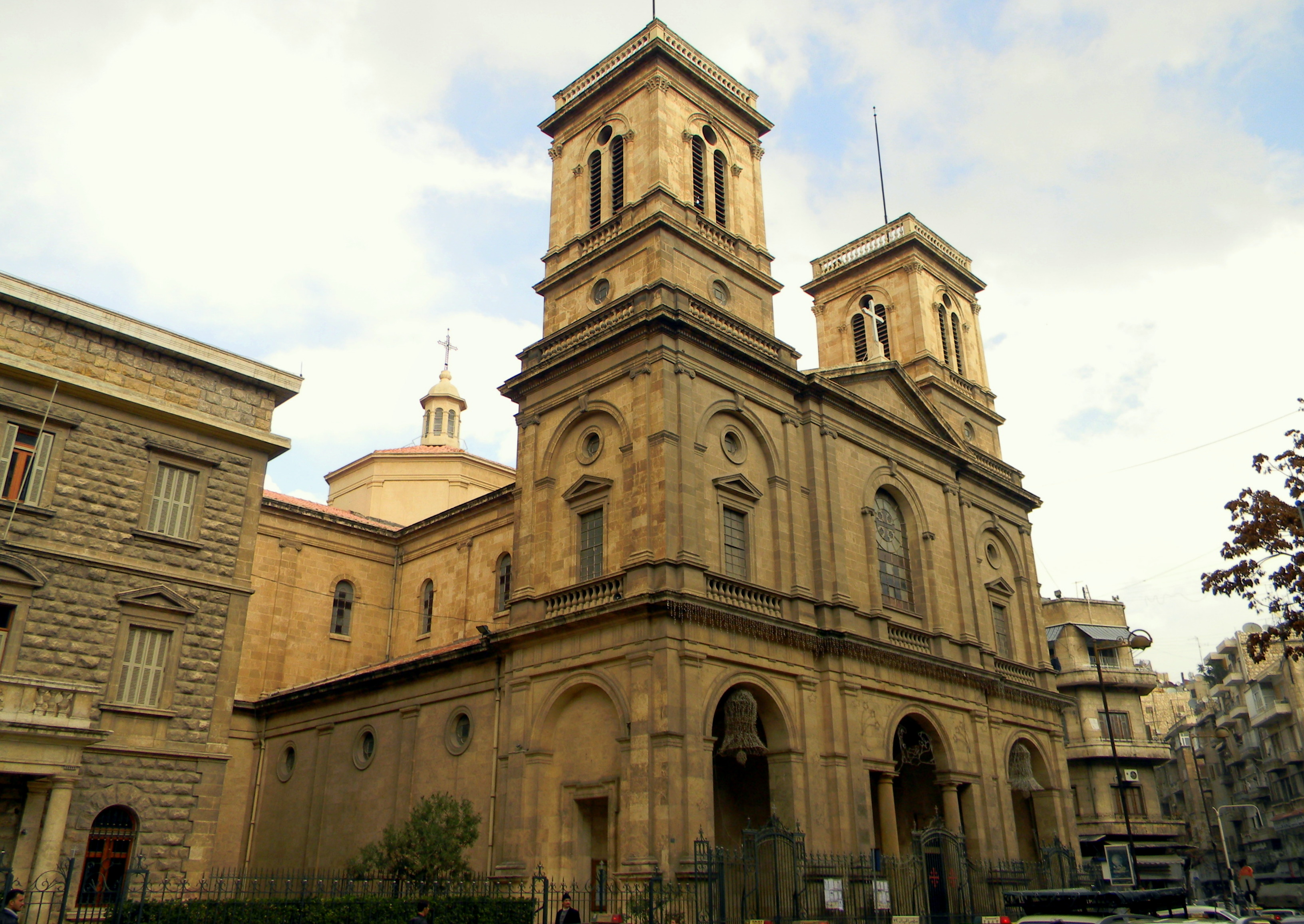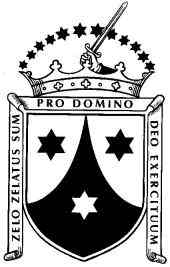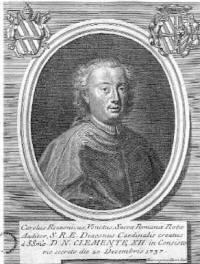|
Apostolic Vicariate Of Syria, Egypt, Arabia And Cyprus
The Apostolic Vicariate of Aleppo (in Latin: Vicariatus Apostolicus Aleppensis) is an apostolic vicariate (Latin pre-diocesan missionary jurisdiction of the Roman Catholic Church, entitled to a titular bishop) and is immediately subject to the Holy See and its missionary Roman Congregation for the Oriental Churches"Apostolic Vicariate of Aleppo" ''GCatholic.org''. Gabriel Chow. Retrieved February 29, 2016 The seat of the vicariate is the city of (Halab in Arabic), where the Cathedral of the Child Jesus, was opened by |
Georges Abou Khazen
Georges Abou Khazen, OFM (born on 3 August 1947 in Aïn Zebdeh, Lebanon) is the current Apostolic Vicar of Aleppo. Life Georges Abou Khazen joined the Congregation of the Franciscan on 3 August 1972, and made his perpetual vows and received on 28 June 1973 his ordination to the priesthood. Pope Francis appointed him on 4 November 2013 Vicar Apostolic of Aleppo and Titular Bishop of Rusadus after the resignation of his predecessor Giuseppe Nazzaro as Apostolic Administrator. His episcopal ordination was made by Cardinal Prefect of the Congregation for the Oriental Churches, Cardinal Leonardo Sandri Leonardo Sandri (born 18 November 1943) is an Argentine prelate of the Catholic Church who has been a cardinal since November 2007 and vice dean of the College of Cardinals since January 2020. He was prefect of the Congregation for the Eastern C ... on 11 January of the following year. External links * http://www.catholic-hierarchy.org/bishop/baboukh.html {{DEFAULTSORT:Khazen ... [...More Info...] [...Related Items...] OR: [Wikipedia] [Google] [Baidu] |
Carmelites
, image = , caption = Coat of arms of the Carmelites , abbreviation = OCarm , formation = Late 12th century , founder = Early hermits of Mount Carmel , founding_location = Mount Carmel , type = Mendicant order of pontifical right , status = Institute of Consecrated Life , membership = 1,979 (1,294 priests) as of 2017 , leader_title = Motto , leader_name = la, Zelo zelatus sum pro Domino Deo exercituumEnglish: ''With zeal have I been zealous for the Lord God of hosts'' , leader_title2 = General Headquarters , leader_name2 = Curia Generalizia dei CarmelitaniVia Giovanni Lanza, 138, 00184 Roma, Italia , leader_title3 = Prior General , leader_name3 = Mícéal O'Neill, OCarm , leader_title4 = Patron saints , leader_name4 = Our Lady of Mt. Carmel, Elijah , parent_organization = Catholic Church , website ... [...More Info...] [...Related Items...] OR: [Wikipedia] [Google] [Baidu] |
Roman Congregation For The Evangelization Of Peoples
Roman or Romans most often refers to: *Rome, the capital city of Italy *Ancient Rome, Roman civilization from 8th century BC to 5th century AD *Roman people, the people of ancient Rome *'' Epistle to the Romans'', shortened to ''Romans'', a letter in the New Testament of the Christian Bible Roman or Romans may also refer to: Arts and entertainment Music * Romans (band), a Japanese pop group * ''Roman'' (album), by Sound Horizon, 2006 * ''Roman'' (EP), by Teen Top, 2011 *" Roman (My Dear Boy)", a 2004 single by Morning Musume Film and television * Film Roman, an American animation studio * ''Roman'' (film), a 2006 American suspense-horror film * ''Romans'' (2013 film), an Indian Malayalam comedy film * ''Romans'' (2017 film), a British drama film * ''The Romans'' (''Doctor Who''), a serial in British TV series People *Roman (given name), a given name, including a list of people and fictional characters *Roman (surname), including a list of people named Roman or Romans *Ῥωμ� ... [...More Info...] [...Related Items...] OR: [Wikipedia] [Google] [Baidu] |
Congress Of Vienna
The Congress of Vienna (, ) of 1814–1815 was a series of international diplomatic meetings to discuss and agree upon a possible new layout of the European political and constitutional order after the downfall of the French Emperor Napoleon Bonaparte. Participants were representatives of all European powers and other stakeholders, chaired by Austrian statesman Klemens von Metternich, and held in Vienna from September 1814 to June 1815. The objective of the Congress was to provide a long-term peace plan for Europe by settling critical issues arising from the French Revolutionary Wars and the Napoleonic Wars without the use of (military) violence. The goal was not simply to restore old boundaries, but to resize the main powers so they could balance each other and remain at peace, being at the same time shepherds for the smaller powers. More fundamentally, strongly generalising, conservative thinking leaders like Von Metternich also sought to restrain or eliminate republican ... [...More Info...] [...Related Items...] OR: [Wikipedia] [Google] [Baidu] |
French Revolution
The French Revolution ( ) was a period of radical political and societal change in France that began with the Estates General of 1789 and ended with the formation of the French Consulate in November 1799. Many of its ideas are considered fundamental principles of liberal democracy, while phrases like '' liberté, égalité, fraternité'' reappeared in other revolts, such as the 1917 Russian Revolution, and inspired campaigns for the abolition of slavery and universal suffrage. The values and institutions it created dominate French politics to this day. Its causes are generally agreed to be a combination of social, political and economic factors, which the ''Ancien Régime'' proved unable to manage. In May 1789, widespread social distress led to the convocation of the Estates General, which was converted into a National Assembly in June. Continuing unrest culminated in the Storming of the Bastille on 14 July, which led to a series of radical measures by the Assemb ... [...More Info...] [...Related Items...] OR: [Wikipedia] [Google] [Baidu] |
Suppression Of The Jesuit Order
The suppression of the Jesuits was the removal of all members of the Society of Jesus from most of the countries of Western Europe and their colonies beginning in 1759, and the abolishment of the order by the Holy See in 1773. The Jesuits were serially expelled from the Portuguese Empire (1759), France (1764), the Two Sicilies, Malta, Parma, the Spanish Empire (1767) and Austria, and Hungary (1782). This timeline was influenced by political manoeuvrings both in Rome and within each country involved. The papacy reluctantly acceded to the anti-Jesuit demands of various Catholic kingdoms while providing minimal theological justification for the suppressions. Historians identify multiple factors causing the suppression. The Jesuits, who were not above getting involved in politics, were distrusted for their closeness to the pope and his power in the religious and political affairs of independent nations. In France, it was a combination of many influences, from Jansenism to free-tho ... [...More Info...] [...Related Items...] OR: [Wikipedia] [Google] [Baidu] |
Lebanon
Lebanon ( , ar, لُبْنَان, translit=lubnān, ), officially the Republic of Lebanon () or the Lebanese Republic, is a country in Western Asia. It is located between Syria to the north and east and Israel to the south, while Cyprus lies to its west across the Mediterranean Sea; its location at the crossroads of the Mediterranean Basin and the Arabian hinterland has contributed to its rich history and shaped a cultural identity of religious diversity. It is part of the Levant region of the Middle East. Lebanon is home to roughly six million people and covers an area of , making it the second smallest country in continental Asia. The official language of the state is Arabic, while French is also formally recognized; the Lebanese dialect of Arabic is used alongside Modern Standard Arabic throughout the country. The earliest evidence of civilization in Lebanon dates back over 7000 years, predating recorded history. Modern-day Lebanon was home to the Phoenicians, a ma ... [...More Info...] [...Related Items...] OR: [Wikipedia] [Google] [Baidu] |
Antoura
Aintoura ( ar, عينطورة) is a town and municipality in the Keserwan District of the Keserwan-Jbeil Governorate, Lebanon. It is located 18 kilometers north of Beirut. The average elevation of Aintoura is 230 meters above sea level and its total land area is 71 hectares. Its inhabitants are predominantly Maronite Christians. History Aintoura, which means "water source of the mountain" (ܛܘܪܐ) in Syriac Syriac may refer to: *Syriac language, an ancient dialect of Middle Aramaic *Sureth, one of the modern dialects of Syriac spoken in the Nineveh Plains region * Syriac alphabet ** Syriac (Unicode block) ** Syriac Supplement * Neo-Aramaic languages a ..., is a very old village inhabited, as tools found in two of its historic grottos witness, since the Stone Age. More recent history shows that Aintoura has been inhabited between 1307 and 1515, and since 1657 when people started living there on a continuous basis. Main Religious Centers of Attraction: The Convent of the Visitat ... [...More Info...] [...Related Items...] OR: [Wikipedia] [Google] [Baidu] |
Papal Brief
A papal brief or breve is a formal document emanating from the Pope, in a somewhat simpler and more modern form than a papal bull. History The introduction of briefs, which occurred at the beginning of the pontificate of Pope Eugene IV (3 March 1431 – 23 February 1447), was prompted for the same desire for greater simplicity and expedition that had already been responsible for the disappearance of the greater bulls and the general adoption of the less cumbersome ''mandamenta''. A brief (from the Latin "''breve'' for "short") was a compendious papal letter which dispensed with some previous formalities. A brief was written on vellum, generally closed, i.e., folded, and sealed in red wax with the papal ring of the fisherman. The Pope's name appears first and at the top, normally written in capital letters, e.g.: "PIUS PP III", and instead of the formal salutation in the third person used in papal bulls, the brief at once adopts a direct form of address, e.g., "''Dilecte fili ... [...More Info...] [...Related Items...] OR: [Wikipedia] [Google] [Baidu] |
Apostolic Vicariate Of Algiers
Apostolic may refer to: The Apostles An Apostle meaning one sent on a mission: *The Twelve Apostles of Jesus, or something related to them, such as the Church of the Holy Apostles *Apostolic succession, the doctrine connecting the Christian Church to the original Twelve Apostles *The Apostolic Fathers, the earliest generation of post-Biblical Christian writers *The Apostolic Age, the period of Christian history when Jesus' apostles were living *The ''Apostolic Constitutions'', part of the Ante-Nicene Fathers collection Specific to the Roman Catholic Church *Apostolic Administrator, appointed by the Pope to an apostolic administration or a diocese without a bishop *Apostolic Camera, or "Apostolic Chamber", former department of finance for Papal administration * Apostolic constitution, a public decree issued by the Pope *Apostolic Palace, the residence of the Pope in Vatican City *Apostolic prefect, the head of a mission of the Roman Catholic Church *The Apostolic See, sometimes us ... [...More Info...] [...Related Items...] OR: [Wikipedia] [Google] [Baidu] |
Congregation Of The Mission
The Congregation of the Mission ( la, Congregatio Missionis) abbreviated CM and commonly called the Vincentians or Lazarists. is a Roman Catholic society of apostolic life of Pontifical Right for men founded by Vincent de Paul. It is associated with the Vincentian Family, a loose federation of organizations who look to St Vincent de Paul as their founder or Patron. History The Congregation has its origin in the successful mission to the common people conducted by Vincent de Paul and five other priests on the estates of the Gondi family. More immediately it dates from 1624, when the little community acquired a permanent settlement in the ''Collège des Bons Enfants'' in Paris, which later became a seminary under the name of Fermin, St. Firmin. The first missions of the Vincentians were in the suburbs of Paris and in Picardy and Champagne. [...More Info...] [...Related Items...] OR: [Wikipedia] [Google] [Baidu] |
Pope Clement XIII
Pope Clement XIII ( la, Clemens XIII; it, Clemente XIII; 7 March 1693 – 2 February 1769), born Carlo della Torre di Rezzonico, was head of the Catholic Church and ruler of the Papal States from 6 July 1758 to his death in February 1769. He was installed on 16 July 1758. His pontificate was overshadowed by the constant pressure to suppress the Society of Jesus but despite this, he championed their order and also proved to be their greatest defender at that time. He was also one of the few early popes who favoured dialogue with Protestants and to this effect hoped to mend the schism with the Catholic Church that existed in England and the Low Countries. These efforts ultimately bore little fruit. Biography Early life Carlo della Torre di Rezzonico was born in 1693 to a recently ennobled family of Venice, the second of two children of the man who bought the unfinished palace on the Grand Canal (now Ca' Rezzonico) and finished its construction. His parents were Giov ... [...More Info...] [...Related Items...] OR: [Wikipedia] [Google] [Baidu] |




.png)
